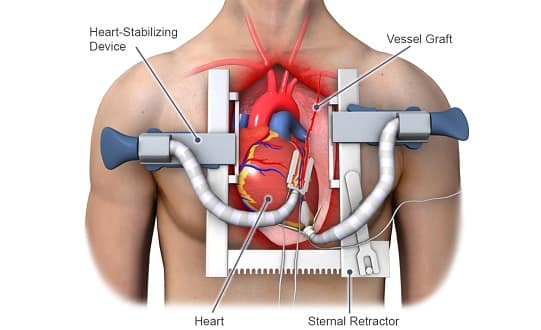Coronary artery Bypass graft surgery (CABG) is performed by the surgeon to treat coronary artery disease. This disease is a blockage or narrowing of the coronary arteries, a source of supplying nutrients and oxygen to the heart muscle. CAD, commonly known as heart disease or ischemic heart disease is usually caused by the build-up of fatty material inside the arteries called plaque; as a result, restraining the supply of oxygen-rich blood to the heart muscle.
Not receiving enough blood flow to your heart muscle can put you at risk for a heart attack or cause chest pain called angina. The only solution to treat this disease is heart bypass Surgery which is very similar to signal controllers or traffic that unblocks the congestion so that path is clear.

The top medical Indian hospital is known to provide comprehensive treatment options at a highly cost-effective cost. Professional & experienced doctors, immediate treatments, hi-tech technology makes your surgery smooth and hassle-free.
In India, the bypass surgery cost starts from Rs.2, 00,000 up to Rs.5,18,000. This cost varies, depending on the experience of the surgeon, the hospital you choose, and the type of specialist you choose. The cost also depends on the type of bypass surgery which may include:
The main objective of CABG surgery is a treatment for improvising the blood flow to the heart muscle. Please note that it is a temporary solution to CAD but in such cases to clear this obstacle on the coronary arteries, CABD surgery is only the solution. The surgery can perform by a surgeon with different types of CABG surgeries which include:
The surgery types vary from patient's health condition, overall health and prescribed by the surgeon.
1. Traditional Coronary Artery Bypass Grafting
The method is used when at least one main artery needs to be bypassed. The chest bone is unlocked to enter the heart during this surgery. A heart-lung bypass machine is also used by specialists to keep oxygen and blood moving throughout the body. That enables the specialist to work on a running heart. Mild electric shocks are used to revive the heart in some cases.
2. off-Pump Coronary Artery Bypass Grafting
This method is slightly similar to the traditional method as the chest bone is unlocked to access the heart. The only difference is this method is bypass machine isn't used, and the heart isn't stopping. It is also known as beating heart bypass grafting.
3. MICS CABG
MICS CABG and OFF-Pump are similar to each other. In this surgery, the surgeon makes a small cut on the patient's on the left side of the chest within the ribs. The surgery is mainly used to bypass the blood vessels in front of the heart. This surgery is not for the person with two coronary needs to be bypassed.
Q1. Are There Any Dietary Restrictions Prior To Or After The Bypass Surgery?
Expert surgeons say that there are no particular dietary restrictions when it comes to bypass surgery. Since most of the time, heart blockage issues occur because of a bad lifestyle and unhealthy food, it is always a good choice to eat healthy and fresh food for better heart health. Fresh vegetables would be a great way to maintain good heart health, and try to stay properly hydrated. Along with a good diet, if you can make exercising a part of your daily routine once you've fully recovered, it'll work like a charm and perhaps prevent any heart problems in the future.
Q2. During CABG, Which Procedure Is The Best, On-Pump or Off-Pump?
Coronary artery bypass surgery is the most effective heart surgery to lower the chance of the patient having heart attacks in the future. Usually, the surgeons don’t recommend on-pump surgery if you’ve other issues like liver or vascular disease. On the other hand, with an off-pump procedure, surgeons use stabilizers to keep your heart still. So yeah, it is always better to consult the options with your doctor before they even begin the procedure.
Q3. How Much Long Would It Take To Fully Recover?
Usually, you won’t get discharged for around a week or two after your bypass surgery. But the recovery factor can also depend upon a few other factors like your age, medical condition, the seriousness of your case, etc. If you’re younger, and your medical condition is much stronger, then you can expect to recover and get discharged even sooner.
Q4. Are There Any Alternatives To Bypass Surgery?
Talking about the surgical methods, so you have the options like Balloon angioplasty and Enhanced external counterpulsation. In minor cases, diet and lifestyle changes with suitable medication can work like a charm. But if your condition is critical, bypass surgery is the best choice to save the patient’s life.